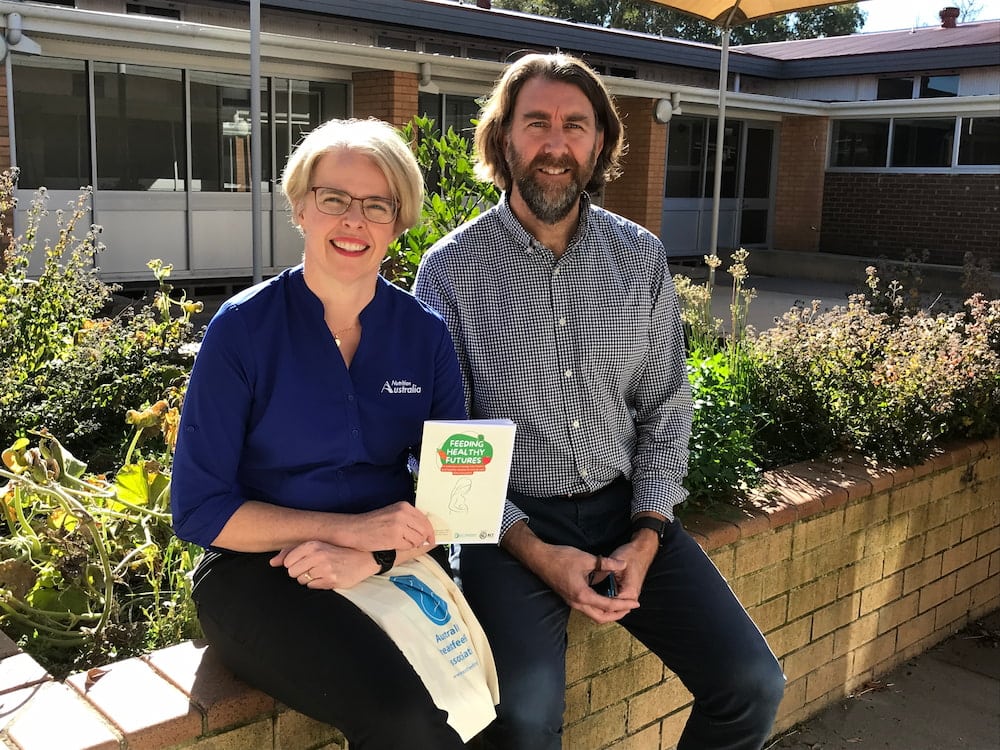Feeding children should be both elementary and alimentary, but many young parents find that it poses them problems. However, a free new program, run by the ACT Nutrition Support Service and funded by the ACT Government, will help Canberra parents from pregnancy through toddlerhood.
“The first 1,000 days in a child’s life [the time between conception and two years of age] is a really crucial period of time where we can set the foundation for healthy eating habits and establish the healthy profile of a growing child from conception until two,” dietitian Leanne Elliston explains.
To that end, Nutrition Australia ACT (the ACT NSS’s ‘parent’ body) has developed a three-stage program, Feeding Healthy Futures, that educates parents about nutrition in pregnancy, introducing solids, and transitioning to ‘family food’.
Each stage of the program will last for three weeks, and consists of three face-to-face hour-long group sessions at ACT libraries.
The program aims to reach 75 women. It is in the second half of recruitment now, and there are spaces in Gungahlin and Coombs classes beginning next week. More information is available on the ACT Nutrition Support Service website.
“We’re there to support parents throughout that whole thousand-day journey,” Ms Elliston said. “We’re really helping to set them up for a healthy life ahead.”
Three stages
The program recruits women in their second trimester of pregnancy, and runs a “fun and interesting” nutrition education program about the health aspects of their pregnancy and their growing baby.
During pregnancy, developing foetuses must get the right amount of nutrition, Ms Elliston explains. Mothers should also be mindful of their nutritional wellbeing: it affects them physically during pregnancy, and aids their recovery and mental health postpartum. Women who eat well, get a good variety of nutrition, and do not depend too much on ultra-processed foods, high in sugar and salt, will have a better resilience and stronger mental health.
“There are always concerns around pregnant women perhaps not looking after themselves – ensuring that they get enough nutritional adequacy from food, and are aware of the sorts of foods they need to be conscious of,” Ms Elliston said.
The program recommends women avoid alcohol, limit caffeine, and alerts them to mercury content in foods and to listeria (a foodborne bacterial illness). It also encourages breastfeeding, and introduces them to support such as the Australian Breastfeeding Association.
The mothers return when their children are around four months old, before they start solids. They learn when to introduce solids, what signs to look for, and some of the first foods that are ideal for babies.
“Introducing solids can be a really crucial time in supporting parents and ensuring that children are introduced to solids at the right time, and that they progress through a range of different foods and textures in those first months of solid introduction,” Ms Ellison said.
The third stage of the program takes place when the children are around 12 months, independent (sometimes fussy) eaters, and transitioning to family foods.
“Parents shouldn’t feel they have to provide special foods for their children,” Ms Ellison said. “They should all try to eat the same sort of foods as a family. That’s a really important time for children to establish those healthy eating habits and enjoy a variety of foods.”
Everyone should eat a wholesome diet, she recommends: a variety and balance of foods from each of the five main food groups (fruits, vegetables, grains, proteins, dairy). On the other hand, they should minimise discretionary foods (high in sugar, salt, and fat), particularly highly processed, heavily marketed, unhealthy foods that are cheap and easy to access, but harmful in the long term if eaten regularly.
“It’s a real concern when we see young children being exposed to discretionary foods,” Ms Ellison said. “That certainly sets the foundation for them to have a taste for unhealthy foods and continue eating those foods throughout their lives.”
Ms Ellison believes the program will be very effective. Participants have told her they appreciate that they can spend time talking about food and nutrition, have their questions answered, and share experiences. The program is also a way for young parents to make friends with others.
ACT Government funding preventive health
The ACT Government has provided more than $163,000 for the Feeding Healthy Futures program through its Health Promotion Grants, which fund community organisations to improve the health of Canberrans and minimise the risk of developing chronic diseases.
ACT Health commits about $2.4 million each year through the grants, explained Mark Tournier, ACT Health’s director of health promotion and grants. Recently, it awarded nine organisations $1.5 million for programs that support healthy eating and active living in children and young people, and $380,000 for 10 organisations to reconnect communities after the COVID-19 pandemic.
These are priorities under the ACT’s Healthy Canberra: ACT Preventive Health Plan, which supports Canberrans to make lifestyle choices that promote good health and prevent chronic disease, Mr Tournier said.
Half of adult Canberrans suffer at least one chronic condition, Mr Tournier said: heart conditions, diabetes, cancer, and mental illness. But about one-third of those diseases are preventable through modifiable actions.
“One important way we can help prevent chronic disease is by taking action to support a healthier diet, or active living, or reducing risk behaviours [alcohol, tobacco, and drugs],” Mr Tournier said.
Last week, ACT Health opened consultation on the new draft Preventive Health Plan.
“Over the coming weeks,” Mr Tournier said, “we will be out in the community having conversations about prevention, and asking Canberrans what they see as priority actions to take forward in this plan to support good health and wellbeing for our community. This is a great opportunity for Canberrans to have their say to help guide government action.”
Consultation is open until the end of July. Visit the YourSay page for more information.



